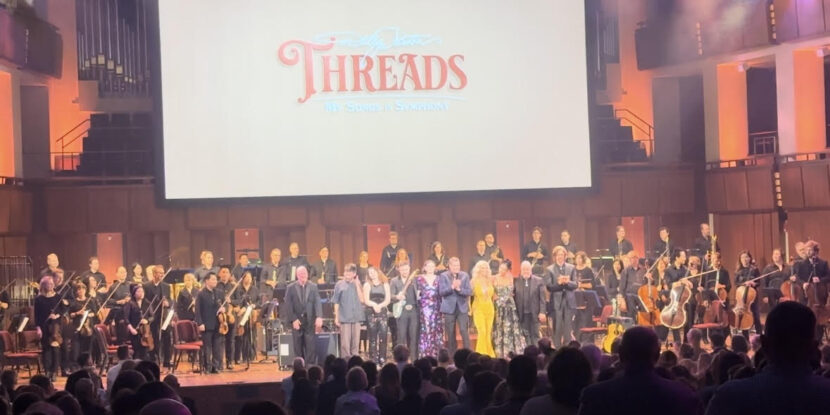On the sultry evening of Friday, June 27, The National Pulse was granted exclusive access to a production at once opulent, nostalgic, and a little haunted by its own premise: Dolly Parton’s Threads: My Songs in Symphony, a two-night orchestral fantasia staged at Washington D.C.’s crown jewel, the Kennedy Center.
Dolly herself—ethereal, untouchable—did not appear in the flesh. Yet she materialized in spirit, projected nearly a dozen times onto the Concert Hall’s grand screen, offering quips, anecdotes, and metaphysical warmth between lush arrangements of her best-loved songs. It was not quite a concert, nor merely a tribute. It was closer to a séance—with sequins.
🎻 OVERTURE OF ABSENCE.
The National Symphony Orchestra, under the exuberant baton of Principal Pops Conductor Steven Reineke, opened the night with an immaculate, full-bodied overture. The acoustics shimmered. Reineke conducted with the rapture of a man caught in a southern Baptist revival tent. The audience thundered back with applause—but there lingered a ghost of anticipation. One conspicuous figure had yet to arrive.
Then, there she was.
Dolly Parton. The woman who once said it takes a lot of money to look this cheap, and who made rhinestones into a philosophy. Appearing on screen as digital fairy godmother, she welcomed us with a warm, almost holographic sincerity. At 78 years old, she looked—let’s be honest—closer to 38, and beamed with that honeyed Tennessee optimism no Botox needle could ever counterfeit.
👗 THREE DOLLYS AND A DREAM.
Soon after, three glamorously bedazzled vocalists—Katelyn Drye, Hollie Hammel, and Blair Lamb—stepped out in unison, like Dolly’s muses summoned from a honky-tonk Olympus. They handled her vocal duties with admirable poise, trading harmonies and solos with a polish that honored the legend, though at times evoked more Vegas revue than mountain ballad.
By the third arrangement, the show found its rhythm. The symphonic interpretation of Dolly’s songs—lush, deliberate, unapologetically sentimental—began to weave the evening’s emotional fabric.
🧵 THE GOLDEN THREADS.
Between performances, Dolly told stories. About writing from the gut. About being banned from the radio for “controversial” lyrics, though she insisted her provocations were purely incidental. “I never meant to be scandalous,” she confessed with a wink. “I just wrote what I felt.”
She described herself as “over-the-top,” which is like calling Niagara Falls “a bit damp.” But it’s this very camp, stitched through with truth, that’s made Dolly not just a country icon but a sort of American saint—part showgirl, part philosopher, all heart.
At one point, she spoke of invisible threads connecting us all—a central theme of the production. It’s easy to dismiss such talk as pop-spiritual puffery. But with Dolly, it feels earned. You believe her when she says the songs come from God. Or maybe from the Smoky Mountains. Close enough.
☀️ A SAD KIND OF FREEDOM.
The night crescendoed around Light of a Clear Blue Morning, her soaring ballad of liberation and melancholy. Dolly recounted writing it in tears while driving home after her final day filming The Porter Wagoner Show, the program that launched her, constrained her, and finally set her free. The rain, she said, stopped as soon as the song found her.
The orchestra’s rendition was thunderous—sunlight breaking through stormclouds in C major. Audience members wept. Others closed their eyes and smiled, like they’d heard from an old friend they’d long feared gone forever.
🎤 LEGACY WITHOUT APOLOGY.
This wasn’t Dolly at her most raw or rambunctious. It was Dolly curated—polished and reverent. But the performance never felt artificial. Instead, it felt like a museum of living memory, with Dolly herself as exhibit and tour guide.
Her impact, after all, is quantifiable. As the Kennedy Center press release reminds us (in numbers as shiny as her costumes):
11 Grammy Awards, 52 nominations;
120 charted singles;
49 Top 10 country albums (a record);
255 million books donated to children;
The #1 Q Score of any performer, living or dead.
She is a monument with a pulse.
🌟 IN THE END.
As the final notes rang out, the orchestra took their bows. Not just one standing ovation—several. And they deserved every single one. So did Dolly, though she was already gone—vanished like a dream after sunrise.
If Threads was meant to tie us together, then for two nights in Washington, D.C., it succeeded—pulling on the hearts of blue-collar dads, pearl-draped matrons, theater nerds, political climbers, and Gen Z TikTokers alike. All humming the same tune.
James Rose contributed to this review.

